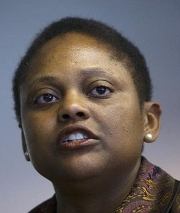US accuses Sudan of delaying international peace force
June 20, 2006 (ENTEBBE, Uganda) — A top United States diplomat riposted to Sudan refusal of UN force to Darfur by accusing Khartoum of using unhelpful tactics to delay the deployment of peacekeepers in the western region of Darfur, ravaged by more than three years of fighting.
 A day after Sudanese President Omar al-Beshir voiced strong opposition to the deployment of Western troops in the region, US Assistant Secretary of State for African Affairs Jendayi Frazer said Khartoum was using “tactics of delay.”
A day after Sudanese President Omar al-Beshir voiced strong opposition to the deployment of Western troops in the region, US Assistant Secretary of State for African Affairs Jendayi Frazer said Khartoum was using “tactics of delay.”
“You must recall that before the African Union came in, they resisted African forces. Now they say they want only the African forces,” she told reporters in Uganda.
“This is a pattern that is not helpful either to the protection of their own citizens or the reputation of the government of national unity,” Frazer added.
The international community has agreed to transform the hapless and cash-strapped African Union Mission in Sudan (AMIS) into a United Nations force to help protect civilians, who have been targeted by both government-backed militia and the rebel groups.
The Sudan government itself has resisted the transformation, with Beshir implying that the West wants to use the force to recolonize Africa’s largest country, which has been wracked by near-constant conflict since it won independence from Britain in 1956.
“I swear that there will not be any international military intervention in Darfur as long as I am in power,” Beshir was quoted as telling a meeting of his ruling National Congress late Monday.
“Sudan, which was the first country south of the Sahara to gain independence, cannot now be the first country to be recolonised,” he said.
Since fighting broke out in February 2003, the combined effect of fighting and a dire humanitarian crisis has left up to 300,000 people dead and more than two million displaced.
Despite the signing of accords aimed at stabilizing the region, the size of Texas, violence still rages, complicating humanitarian operations and leaving a large majority of displaced civilians to fend for themselves.
(ST)
